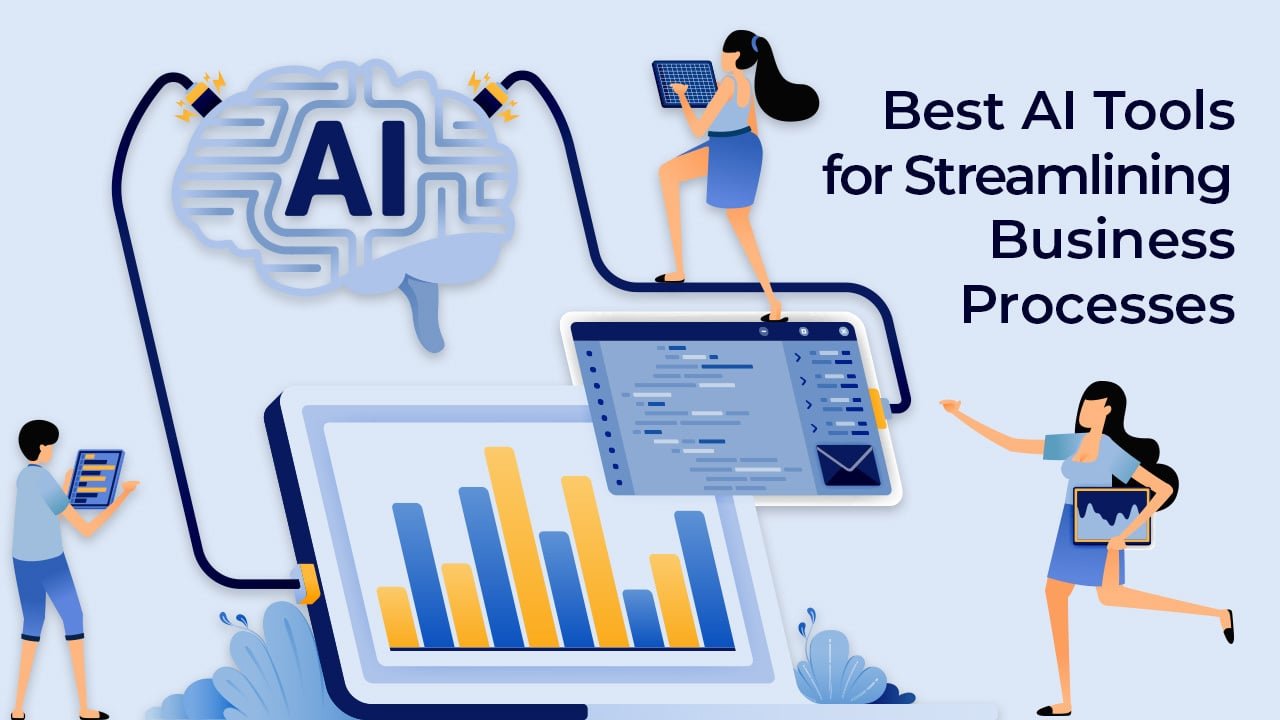In today’s fast-paced and highly competitive business landscape, organizations are constantly seeking innovative ways to enhance efficiency, reduce costs, and deliver higher value to their customers. This pursuit has led to the integration of artificial intelligence (AI) tools into various aspects of business operations, enabling a new era of streamlined processes and optimized workflows.
AI tools for streamlining business processes have emerged as a transformative force, leveraging advanced algorithms and data-driven insights to automate, optimize, and make more informed decisions across a wide range of functions. From customer service and marketing to supply chain management and financial analysis, AI-powered solutions are revolutionizing the way businesses operate.
This paper delves into the world of AI tools designed to streamline business processes, exploring their key capabilities, benefits, and real-world applications. By harnessing the power of AI, companies can unlock unprecedented levels of operational efficiency, agility, and innovation, thereby positioning themselves to thrive in an increasingly dynamic marketplace.
Table of Contents
ToggleThe Role of AI in Business Process Streamlining
Artificial Intelligence (AI) plays a fundamental role in revolutionizing business process streamlining by significantly enhancing efficiency and decision-making capabilities. AI technologies, including machine learning, natural language processing (NLP), and predictive analytics, collectively contribute to optimizing processes and driving organizational success.
Machine learning, a subset of AI, empowers businesses to analyze large volumes of data and extract meaningful patterns. Through continuous learning from data, machine learning algorithms identify trends, anomalies, and insights that human analysis might miss. This capability is particularly valuable for optimizing processes as it enables the identification of bottlenecks, inefficiencies, and areas for improvement. By automating data analysis and decision-making, machine learning expedites problem-solving and ensures data-driven process optimization.
Natural Language Processing (NLP) bridges the gap between human language and computer understanding. It enables AI systems to comprehend and generate human language, facilitating tasks such as automated customer interactions, sentiment analysis, and information extraction from unstructured text. In business processes, NLP enables the automation of tasks like data entry, information retrieval, and even contract analysis, thus accelerating workflows and reducing manual labor.
Predictive analytics utilizes historical and real-time data to forecast future outcomes. By identifying trends and patterns, predictive analytics empowers businesses to make proactive decisions, optimize resource allocation, and anticipate market shifts. This capability aids in demand forecasting, supply chain optimization, and risk management, ultimately leading to more agile and efficient processes.
Criteria for Selecting AI Tools
When selecting AI tools to streamline business processes, organizations should carefully assess several critical factors to ensure seamless integration and successful implementation. These factors collectively determine the tool’s effectiveness in enhancing efficiency, reducing operational costs, and optimizing workflows.
- Ease of Integration: The chosen AI tool should seamlessly integrate with the existing technology stack and software ecosystem. A user-friendly interface and compatibility with commonly used platforms make integration smoother and reduce disruption to ongoing operations.
- Scalability: A scalable AI tool can grow alongside the business, accommodating increased workloads and evolving requirements without compromising performance. Scalability ensures that the tool remains effective as the organization expands.
- Customization: Businesses have unique processes and requirements. A versatile AI tool that allows customization and configuration to match specific needs ensures that processes are streamlined in a tailored manner.
- Compatibility with Existing Systems: The AI tool should be compatible with existing systems, databases, and software solutions. This prevents the need for extensive modifications or overhauls to current infrastructure, saving time and resources.
- Data Security and Privacy: Handling sensitive data is a concern for any business. The AI tool should adhere to industry best practices for data security and privacy, ensuring that critical information remains protected.
- Training and Support: Adequate training and ongoing support are essential for successful adoption. The chosen tool’s provider should offer comprehensive training resources and responsive customer support to address any issues that arise during implementation and beyond.
- Performance and Reliability: The AI tool’s performance and reliability directly impact its effectiveness. Organizations should seek tools that consistently deliver accurate results and minimal downtime.
- Cost-effectiveness: While AI tools offer significant benefits, their cost-effectiveness should be evaluated. This includes not only the initial purchase or subscription cost but also considerations like potential time savings and reduced labor expenses.
- User-Friendly Interface: An intuitive interface contributes to quicker adoption and easier utilization of the AI tool by employees across various roles and skill levels.
- Proven Track Record: The tool’s track record in similar industries or use cases is indicative of its potential success in your business context. Case studies, testimonials, and reviews can provide insights into its real-world impact.
- Future-Readiness: As AI technology evolves, the tool should have the potential to adapt and incorporate new advancements. Flexibility in integrating future upgrades and features is essential.
- Ethical Considerations: Businesses should ensure that the AI tool adheres to ethical guidelines and standards. This includes avoiding biases in decision-making algorithms and maintaining transparency in how AI-driven processes work.
Also Read: Enhancing Content Creation Efficiency with Various WordPress Editor Modes
Top AI Tools For Business Process Streamlining
1. UiPath- AI Tools For Streamlining Business Processes
UiPath stands as a pioneering Robotic Process Automation (RPA) platform that leverages the power of artificial intelligence (AI) to revolutionize the way businesses operate. At its core, UiPath addresses the challenges of repetitive and time-consuming tasks that are prone to human error, thereby ushering in a new era of enhanced efficiency and productivity.
The platform’s AI-driven capabilities empower organizations to automate a myriad of processes, from routine data entry to complex workflows. By employing machine learning and cognitive automation, UiPath not only executes tasks with precision but also learns from patterns in data, adapting and refining its actions over time. This not only expedites operations but also ensures accuracy by significantly reducing the risk of errors.
UiPath’s impact on businesses is profound. It liberates human resources from mundane tasks, allowing employees to focus on more strategic and value-driven activities. The platform’s user-friendly interface enables process automation without necessitating extensive coding knowledge, democratizing automation across departments. Additionally, UiPath provides a suite of tools for process discovery and analysis, enabling organizations to identify processes that are ripe for automation and quantify potential benefits.
In industries where compliance and security are paramount, UiPath maintains a high standard. Its AI-augmented robots can execute tasks while adhering to regulatory guidelines and company policies, instilling trust in sensitive processes.
The AI-powered insights that UiPath offers extend beyond automation. The platform captures valuable data throughout processes, enabling businesses to analyze performance, identify bottlenecks, and make data-driven decisions for continuous improvement.
In a digital landscape where speed, accuracy, and adaptability define success, UiPath emerges as a transformative force. By harnessing the capabilities of AI, businesses can optimize workflows, minimize errors, and redeploy human potential to strategic endeavors that drive innovation and growth. UiPath’s commitment to integrating AI with automation makes it an indispensable tool for any organization aspiring to streamline operations and excel in a competitive market.
Also Read: How to Create WooCommerce Percentage Discounts in Your Online Store?
2. Automation Anywhere
Automation Anywhere stands out as a leading Robotic Process Automation (RPA) solution, facilitating substantial operational efficiency gains for businesses by harnessing the capabilities of AI-driven bots. This platform empowers organizations to streamline intricate tasks and workflows by automating repetitive and time-consuming processes, allowing employees to focus on more strategic and value-added activities.
At its core, Automation Anywhere integrates advanced artificial intelligence to enhance the automation experience. Through machine learning and cognitive automation, the platform can adapt to dynamic scenarios, making intelligent decisions based on data analysis and pattern recognition. This versatility enables the bots to perform a wide range of functions across departments, from data entry and processing to customer interactions and complex decision-making.
Automation Anywhere’s intuitive interface facilitates the creation of bots through a visual, no-code approach, enabling both technical and non-technical users to design and deploy automation solutions. These bots can seamlessly interact with various applications, systems, and databases, fostering cross-functional automation and reducing the need for manual intervention.
By leveraging Automation Anywhere’s AI-driven capabilities, businesses can significantly increase operational accuracy, mitigate human errors, and accelerate processes, resulting in enhanced productivity and cost savings. Moreover, the platform’s robust analytics provide valuable insights into process performance, identifying areas for further optimization and continuous improvement.
3. IBM Watson
IBM Watson stands at the forefront of AI innovation, presenting a comprehensive suite of AI-powered tools and services designed to revolutionize diverse business processes. With its multifaceted capabilities, IBM Watson empowers organizations to harness the potential of artificial intelligence in unprecedented ways.
At its core, IBM Watson offers a sophisticated natural language understanding (NLU) capability, allowing businesses to decipher and process human language with remarkable accuracy. This feature facilitates seamless interactions with customers, automates customer support inquiries, and enables sentiment analysis for informed decision-making.
One of Watson’s standout features is its predictive analytics prowess. By analyzing historical data and patterns, Watson delivers insights that guide strategic decision-making, enhancing resource allocation, and identifying emerging market trends. Furthermore, Watson’s machine-learning capabilities enable the creation of tailored models that evolve and adapt over time, driving continuous improvements in accuracy and efficiency.
IBM Watson’s extensibility is a cornerstone of its appeal. Its modular structure permits integration into diverse business functions such as supply chain management, financial analysis, and healthcare diagnostics. This adaptability ensures that Watson’s AI-driven insights seamlessly align with specific industry needs.
Also Read: The Evolution Of Recruitment: How Technology Is Transforming The Hiring Process
4. Salesforce Einstein
Salesforce Einstein stands as a pioneering AI-powered platform that elevates the realm of customer relationship management (CRM) to unprecedented levels of effectiveness and personalization. By seamlessly integrating cutting-edge artificial intelligence, Einstein revolutionizes how businesses engage with their customers. Through its predictive insights, automation capabilities, and personalized recommendations, it empowers companies to forge stronger, more meaningful connections.
Einstein’s predictive insights utilize advanced data analysis to anticipate customer behavior and trends, enabling businesses to proactively tailor their strategies. This not only enhances decision-making but also assists in offering precisely what customers need, often before they even realize it themselves. The platform’s automation prowess takes over routine tasks, freeing up valuable human resources and reducing errors. Repetitive processes are streamlined and accelerated, leading to increased operational efficiency.
Central to Einstein’s power is its ability to deliver personalized recommendations. By analyzing vast troves of customer data, it generates tailored suggestions that guide businesses in crafting targeted offerings. This fosters a deeply personalized customer experience, bolstering loyalty and engagement. In a business landscape driven by data, Einstein stands as a beacon of insight, providing the tools needed to not only understand but also to predict and fulfill customer desires.
5. Microsoft Power Automate
Microsoft Power Automate, previously recognized as Microsoft Flow, stands as a dynamic and versatile tool designed to revolutionize workflow automation across a spectrum of applications and services. Driven by the prowess of artificial intelligence, this platform empowers users to orchestrate intricate processes seamlessly, heralding a new era of operational efficiency.
At its core, Power Automate offers an intuitive interface that facilitates the creation of automated workflows without necessitating advanced technical skills. Harnessing the capabilities of AI, the tool introduces intelligent triggers and actions that adapt to context, enabling processes to be initiated and executed with greater precision. This adaptability ensures that actions are triggered based on real-time data and conditions, thus minimizing manual intervention and optimizing response times.
Furthermore, the platform thrives on its ability to interconnect diverse applications and services, fostering a cohesive ecosystem where data flows seamlessly across organizational silos. The integration potential spans across Microsoft’s suite of products as well as external applications, allowing for the creation of end-to-end automation pipelines.
Power Automate’s AI-driven insights elevate its functionality, enabling users to glean actionable intelligence from data. Predictive analytics and data-driven decision-making become feasible, enhancing operational foresight and strategic planning.
Also Read: Guide To Build a Best lawyer Website: Must Have Pages, Tips and Lawyer WordPress Themes
6. Alteryx- AI Tools For Streamlining Business Processes
Alteryx stands as a transformative force in the realm of data analytics and process automation, empowering businesses to harness the full potential of their data for strategic decision-making. At its core, Alteryx offers a comprehensive platform that seamlessly blends, cleanses, and analyzes vast datasets, enabling organizations to derive invaluable insights that drive informed choices.
With its user-friendly interface and powerful capabilities, Alteryx revolutionizes the way businesses handle data. Through advanced data blending techniques, disparate data sources are harmoniously integrated, erasing the barriers that often impede comprehensive analysis. Moreover, its data cleansing features ensure accuracy and reliability, eliminating inconsistencies and errors that could distort the analytical process.
However, Alteryx’s impact extends far beyond data manipulation. By leveraging its robust analytics tools, businesses can unravel hidden patterns, trends, and correlations within their data, offering a deeper understanding of their operations, customers, and market dynamics. This newfound insight equips decision-makers with the knowledge needed to drive strategies that resonate with precision and relevance.
In an era where data reigns supreme, Alteryx emerges as a vital instrument for agile decision-making. It empowers organizations to not only navigate the complexities of data but to transform it into a strategic asset. Through its amalgamation of data blending, cleansing, and advanced analytics, Alteryx paves the way for well-informed choices, enabling businesses to seize opportunities and stay ahead in a dynamic and competitive landscape.
Also Read: Top 10 Data Science Communities Every Data Scientist Must Know
7. Zapier
Zapier, a versatile automation tool, serves as a bridge between different applications, facilitating seamless collaboration and task automation across various platforms. Though not exclusively reliant on artificial intelligence (AI), Zapier’s ingenious design empowers businesses to transcend the limitations of manual operations. By enabling connections between disparate apps, it catalyzes a synergistic workflow that optimizes efficiency and resource allocation.
At its core, Zapier operates through user-defined triggers and actions, which it calls “Zaps.” These Zaps act as virtual connectors, triggering specific actions in one application based on events occurring in another. This dynamic functionality liberates teams from repetitive, time-consuming tasks and minimizes the risk of errors stemming from manual intervention.
While not directly AI-driven, Zapier embodies the spirit of automation that underpins AI’s transformative impact. It liberates human potential by freeing individuals from mundane tasks and allowing them to focus on strategic, creative, and value-added activities. Its universal applicability across industries and functions underscores its adaptability, turning the intricacies of integration into an intuitive and accessible process.
Present real-world examples of businesses that have successfully implemented AI tools for process streamlining.
Highlight the challenges they faced and the benefits they gained from these tools.
Conclusion on AI Tools For Streamlining Business Processes
The integration of AI tools for streamlining business processes marks a pivotal advancement in modern organizational efficiency. These tools, leveraging the power of artificial intelligence, have revolutionized how businesses operate, unlocking new levels of automation, optimization, and insight-driven decision-making. By harnessing machine learning, natural language processing, and predictive analytics, companies have been able to transform complex, time-consuming tasks into streamlined workflows, reducing manual intervention and minimizing errors.
The benefits of AI-driven process optimization are evident across various sectors, from customer service and supply chain management to finance and marketing. These tools not only improve accuracy and consistency but also enable businesses to allocate resources more intelligently, leading to significant cost savings. Real-world success stories underline the tangible impact of AI tools, with companies reporting enhanced productivity, faster response times, and improved customer experiences.
Interesting Read:
Selecting AI tools to streamline business processes
Useful Hacks And Customizations For Your BuddyPress Powered Website Via Reign Theme








